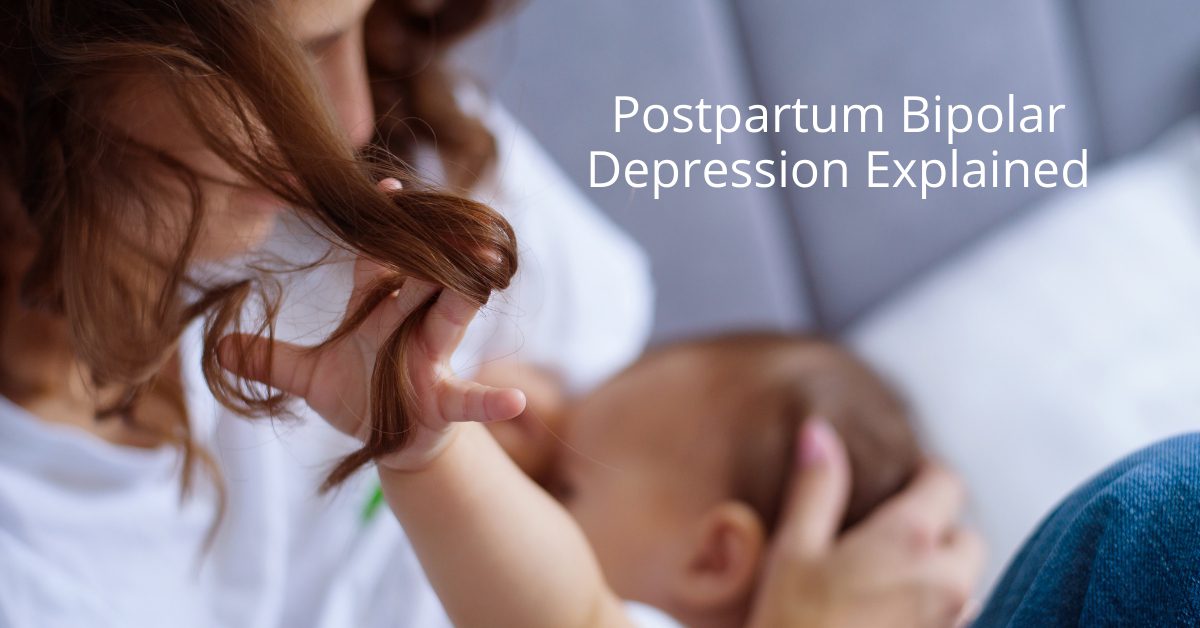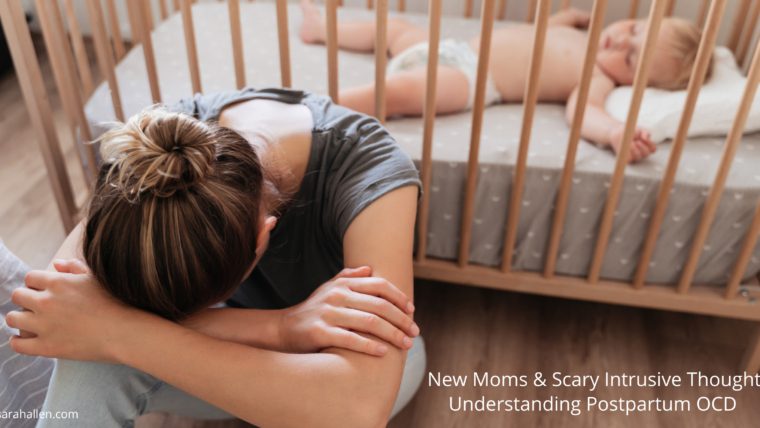Postpartum bipolar depression is a serious mental health condition that can affect new mothers. It combines he symptoms of bipolar disorder with the challenges of postpartum depression. To start with I think it is important to understand how the symptoms of postpartum bipolar depression are different from non-bipolar postpartum depression. Bipolar disorder involves mood swings that include emotional highs (mania) and lows (depression). When these symptoms occur after childbirth, they can be even more intense. During a manic phase, a mother might feel unusually energetic and elated, but this can quickly switch to severe depression where feelings of sadness and hopelessness become overwhelming.
New mothers might not recognize the signs of postpartum bipolar depression right away. Instead, they may attribute their feelings to the typical stresses of new parenthood. However, understanding the symptoms and seeking help can make a significant difference to a mother’s experience of motherhood. If untreated, this condition can disrupt the bonding process between mother and child and affect her quality of life and also potentially affect the entire family. Knowing the signs to watch for and the treatment options available can help new mothers navigate this challenging time more effectively.
Understanding Postpartum Bipolar Depression
Postpartum bipolar depression is a mental health condition that involves episodes of mania and depression, occurring after childbirth. This condition combines the emotional highs of bipolar disorder with the severe lows of postpartum depression, making it complex and challenging to manage.
Mania in postpartum bipolar depression may include high energy, reduced need for sleep, unusually upbeat or irritable moods, and sometimes risky behavior. However, these manic episodes can quickly shift to depressive episodes. During these depressive phases, a mother may experience feelings of intense sadness, hopelessness, fatigue, and difficulty bonding with her baby.
The triggers for postpartum bipolar depression are not fully understood but likely involve a mix of hormonal changes, sleep deprivation, and the stress of adjusting to new motherhood. Genetic factors may also play a role, as those with a family history of bipolar disorder are at higher risk. Recognizing this condition early on can help prevent complications that can affect both the mother and her child.
Recognizing Symptoms of Postpartum Bipolar Depression
So how do you know if you, or a loved one, has bipolar postpartum bipolar depression? Identifying the symptoms can be tricky, especially since some signs overlap with typical new parent stress. However, certain red flags can help differentiate this condition.
1. Frequent Mood Swings: Rapid shifts between feeling very high (mania) and very low (depression) can be a key indicator. These mood swings can happen over days or even hours.
2. Inability to Sleep: During manic phases, mothers may feel wired and unable to sleep, even when they have the chance. Conversely, during depressive phases, mothers may struggle with insomnia or find themselves sleeping too much.
3. Extreme Irritability: Feeling unusually irritable or agitated, especially during manic episodes, is a common symptom.
4. Depressive Symptoms: Experiencing severe sadness, lack of interest in activities, low energy, and feelings of worthlessness during depressive phases.
5. Difficulty Focusing: Struggling to concentrate or make decisions can occur in both manic and depressive phases.
6. Behavior Changes: Noticeable changes in behavior, such as taking unnecessary risks during manic episodes or withdrawing from loved ones during depressive episodes.
These symptoms can disrupt daily life and make it hard for mothers to care for their newborns. Recognizing these signs early can lead to quicker interventions and support.
Understanding and recognizing the symptoms of postpartum bipolar depression help in seeking the right treatment and support. Early detection and intervention are crucial for the well-being of both the mother and the child.
Current Statistics and Trends
Postpartum bipolar depression, while less common than postpartum depression, is a critical mental health issue that affects many new mothers. Understanding its prevalence and impact can help in addressing it more effectively.
According to recent studies, about 20% of women with postpartum depression may also have underlying bipolar disorder. This dual diagnosis often goes underreported, as the symptoms can be mistaken for typical postpartum changes or other mental health conditions. Lack of awareness leads to many cases remaining undiagnosed and untreated.
Trends show that younger mothers and those with a personal or family history of bipolar disorder are more susceptible to postpartum bipolar depression. Additionally, those who have experienced severe mood swings in the past may be at higher risk. The symptoms can last longer and be more intense than those of standard postpartum depression, making daily routines and baby care particularly challenging.
Efforts to improve screening for postpartum bipolar depression have increased. Health professionals now recommend regular mental health check-ups for new mothers, emphasizing the importance of early detection. Increased awareness and better diagnostic tools have led to more accurate identification, enabling timely intervention and treatment.
Effective Treatment Options for Postpartum Bipolar Depression
Treating postpartum bipolar depression requires a comprehensive approach. Several treatment options are available to help manage symptoms and improve quality of life for new mothers.
1. Medication: Mood stabilizers, antidepressants, and antipsychotics can help control mood swings and depressive symptoms. A psychiatrist who specializes in maternal mental health can recommend the most suitable medication based on the individual’s needs and medical history.
2. Therapy: Cognitive Behavioral Therapy (CBT) is effective in treating postpartum bipolar depression. It helps mothers identify negative thought patterns and develop healthier coping strategies. Family therapy can also be beneficial in improving communication and support within the household.
3. Support Groups: Joining a support group for mothers dealing with bipolar disorder or postpartum depression can provide a sense of community and shared understanding. Connecting with others facing similar challenges can reduce feelings of isolation and offer practical advice.
4. Sleep: Ensuring enough sleep is the most important aspect that can help stabilize mood and reduce stress levels. I work with partners and family members to ensure that sleep is a priority for the mom while she is getting better.
5. Professional Support: Working with a therapist and a psychiatrist that specialize in maternal mental health is incredibly important and making sure appointments schedules are maintained so the healthcare team can provide ongoing support and adjustment to treatment plans as needed is crucial. Consistent monitoring ensures that the treatment remains effective and any side effects are managed promptly.
A combination of these treatments often yields the best results. Personalizing the approach to fit the mother’s specific needs is also crucial for successful management of postpartum bipolar depression.
Conclusion
Recognizing and treating postpartum bipolar depression is essential for the well-being of both the mother and her child. Understanding the condition and recognizing its symptoms early can lead to timely interventions. The statistics highlight the importance of ongoing awareness and improved screening methods to better identify and treat affected individuals. With effective treatment options available, new mothers can receive the help they need to manage their symptoms and lead healthier lives.
If you or someone you know is experiencing symptoms of postpartum bipolar depression, the Postpartum Depression Alliance of Illinois is here to help. We promote awareness, prevention, and treatment of maternal mental health issues throughout the state of Illinois. Visit our website for more information and support. Your health and happiness are our priorities.




